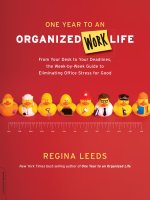Mastery for every one want to success
Bạn đang xem bản rút gọn của tài liệu. Xem và tải ngay bản đầy đủ của tài liệu tại đây (1.99 MB, 30 trang )
Mastery by George Leonard
1
At the heart of it, mastery
is practice. Mastery is
staying on the path.
George Leonard (1923 - 2010)
A pioneer in the field of human potentialities, is author of
twelve books, including The Transformation, Education and
Ecstasy, The Silent Pulse, the Ultimate Athlete and Mastery
The last thirty years of his life have been inspired by Aikido
2
1
Introduction
2
What is Mastery?
3
The Master’s Journey
4
The Five Master Keys
5
Tools For Mastery
6
Conclusion
7
Appendix
3
Introduction
What makes an Olympic athlete or a Nobel
Prize-winner different from the rest of us?
What separates someone who is successful
in health and fitness?
Are successful people cut from a different
cloth?
Success doesn’t just happen. Successful people follow a process,
they put in massive amounts of work and fail over and over before
they ‘make it’. Success isn’t chance, Success is mastery.
4
Part 1 - The Master’s Journey
5
Chapter 1
Mastery is…
A journey
The process where what was difficult
becomes easier
A life long commitment to hone your
skills
Being goalless
Realizing that the ultimate goal is the
path to mastery itself
Practicing, even when you seem to be
getting nowhere
6
The Common Misconception
Most time spent at a skill level is spent on a plateau where you do
not improve and are often frustrated. Afterwards you will improve a
lot then get a little worse and return to another plateau; which is an
improvement to your previous plateau.
Realistic model
7
Chapter 2
Dabbler
• The dabbler tries many things, gets
improvement, plateaus and gets bored then tries
something new.
Obsessive
• The obsessive is purely result oriented. They are
inconsistent and when they hit a plateau they
quit because their results aren’t increasing
linearly
Hacker
• The hacker is content where he’s at. He gets
good then doesn’t care to continue improving.
8
There is nothing wrong with being the dabbler, the
obsessive, or the hacker. Everyone is sometimes all of
them. But if you want to become a master at a certain
skill, you must stay on the path of mastery.
Which are YOU?
Dabbler
Obsessive
Hacker
Jack of all
trades and
master of none
Full throttle
until engine
crash
No reason to
move from
Easy Street
9
Chapter 3 America’s War Against Mastery
Marketing and culture tend to communicate quick fixes and instant
gratification. It communicates learning being linear or instantaneous.
Which is not reality.
10
Anti-Mastery Behavior
Eye only on the
Prize!
Results are
everything
Drugs for
competitive edge
Celebrity Status
The Quick-Fix
Mentality
Instant
Gratification
Fast Money
Buy it Now
Gamble as
opposed to earn
Spend more than
you have
Money is
everything
No need to build
wealth
11
The Path of Endless Climax…
A war that cannot be won
HEADLINE:
Drugs and Today’s Wall Street
…Leads to a Bitter Crash
12
Chapter 4 Loving the Plateau
Find joy in regular practice
Practice for the sake of practice itself, NOT
for reaching a certain level
Appreciate what is most essential and
enduring in your life
We are taught in countless ways to enjoy the prize, the climatic
moment, but a true life of mastery is spent in the plateau.
13
Relish the Journey
Where in our upbringing, our schooling, our
career are we explicitly taught to value, to enjoy
and to love the plateau, the long stretch of
diligent effort with no seeming progress?
14
14
Trying to Escape the Plateau…
could create a restless life full of distractions
or self-destruction.
15
Part 2 – Five Mastery Keys
MASTERY
16
Chapter 5 Key 1: Instruction
• A good instructor will
point out both the
good and the bad
• Understand teachers
are not perfect
• Know when it is time to
say good bye to a
teacher
• The good thing about
no instruction is you
have unlimited
potential as nobody
will tell you something
will not work
• The bad thing is it can
take much longer to
learn and you will not
have anyone to help
you along the way
17
Chapter 6 Key 2: Practice
Practice is NOT something you do, it’s something you ARE
Larry Bird
Jerry Rice
Bill Gates
Started
practicing
basketball at
age 4 and
never
stopped
Hardest
working and
most
disciplined
receiver in
NFL history
At 13 years
of age had
10,000 hours
practice in
computer
programming
18
Chapter 7 Key 3: Surrender
Surrender to your teacher and the demands of
your discipline
Be willing to look like a fool
There are times when we forfeit hard-won
competency in order to advance to the next
stage. (Like when a golfer decides to change his or
her swing)
For the master, surrender means there are no
experts, only learners.
19
Chapter 8 Key 4: Intentionality
Visualizations
Thoughts,
images and
feelings play into
your success
Intentionality
fuels the
master’s journey
Every master is a
master of vision
Jack Nicklaus
• Always pictured golf shot before swing
• Believed only 10% of success of shot due to
swing
Arnold Schwarzenegger
• Believed that pumping a weight one time
with full consciousness was worth 10 without
mental awareness
Sir James Jeans (astronomer)
• More and more, the universe looks like a
great thought rather than a great machine
20
Chapter 9 Key 5: The Edge
• Pushing the limits for
higher performance,
sometimes to the
point of stupidity
• You must be able to
play the edge while
respecting practice
Chuck Yeager
Agony of Defeat
First pilot to break
the sound barrier
in X-1 rocket plane.
Julie Moss, 23,
collapsed and
crawled to finish
Hawaii’s Ironman
Triathlon World
Championship.
Injured at the time,
used a broom
handle to close
rocket door.
Heroic or stupid?
21
Part 3 – Tools for Mastery
MASTERY
22
Chapter 10
Why Resolutions Fail & What to Do About It
Everyone resists change, good or
bad. Expect some backsliding.
Resistance to change is
proportional to size/speed of
change, not if it is good or bad.
Be aware of how homeostasis
works.
Develop a support system.
Particularly those who have gone
before you.
23
Chapter 11 Getting Energy for Mastery
You gain energy by using energy
Maintain physical fitness
Acknowledge the negative and
accentuate the positive
Be honest with others, it will
revitalize you
Set your priorities
Make your commitments, take
action
Get on the pathway of mastery, and
choose to stay on it
24
Chapter 12 Pitfalls Along the Path
1.
2.
3.
4.
5.
6.
7.
8.
9.
10.
11.
12.
13.
Conflicting Way of Life
Obsessive Goal Orientation
Poor Instruction
Lack of Competitiveness
Over Competitiveness
Laziness
Injuries
Drugs
Prizes and Medals
Vanity
Dead Seriousness
Inconsistency
Perfectionism
Your job may not be your
path.
Your teacher is a teacher,
not a guru.
Competition keeps you
motivated.
External validation can
often stop or slow the
pathway to mastery
You must be willing to
look like a fool.
Have fun.
25









